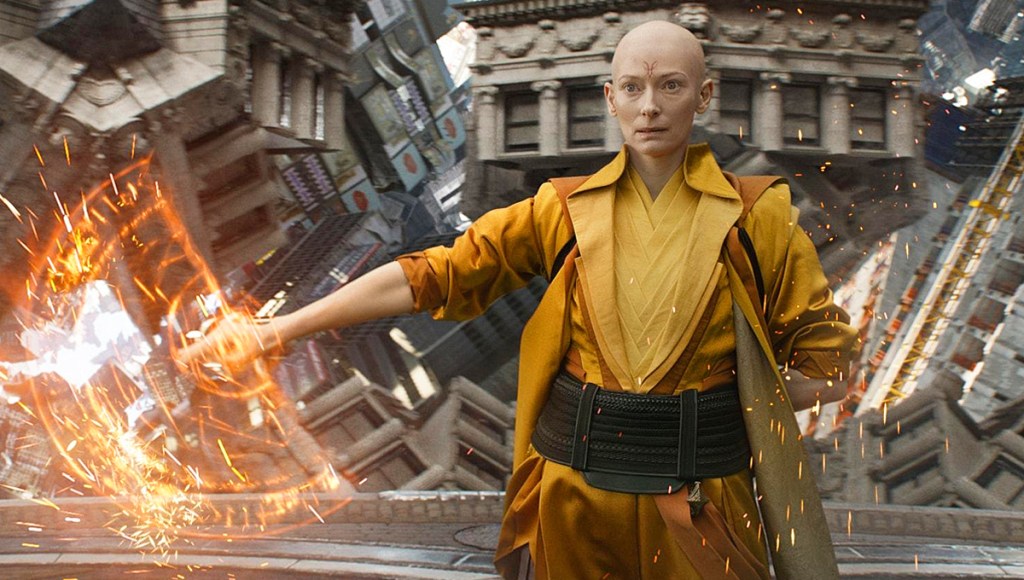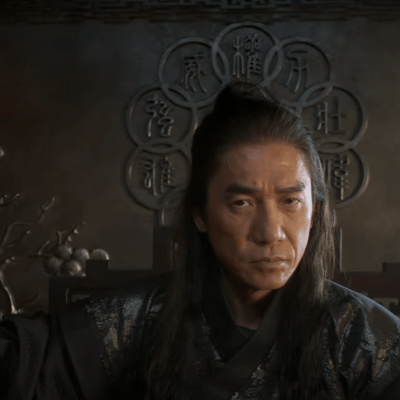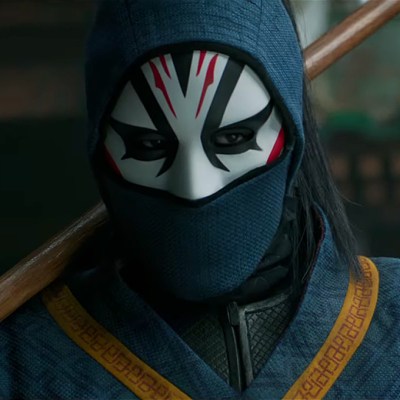How Shang-Chi Could Make Up for Doctor Strange’s Ancient One Whitewash
Shang-Chi and the Legend of the Ten Rings is clearly being positioned as the Marvel Cinematic Universe’s next premiere tent-pole, as a walk through the action-figure-teeming toy aisles of mass retail stores now proves. Notwithstanding what that means for the next immediate MCU movie event, the July premium streaming premiere of Black Widow, the fact that Marvel and its Disney-powered marketing machine is supporting Shang-Chi to this extent is a sign of the film’s importance to the overall MCU. It’s a notion that Marvel Studios president Kevin Feige affirms with a key contrition about a pertinent past controversy.
September’s Shang-Chi premiere will unleash the MCU’s adaptation of Marvel Comics’ Master of Kung-Fu, a title once considered a relic of 1970s pop culture’s post-Bruce-Lee martial arts craze, but has since been revived in the modern era. The film will be the first MCU offering to showcase a predominantly Asian cast; an attribute that accurately complements its plot pertaining to the film’s titular Chinese crime syndicate, the Ten Rings, which has been lurking in the MCU’s shadows since the very beginning in 2008’s Iron Man. However, Feige explains to Men’s Health how said Asian cast also represents a major course correction for the MCU regarding the maligned casting of chameleonic white actress Tilda Swinton as the Ancient One in 2016’s Doctor Strange, which whitewashed a character who’s traditionally an elderly Asian man.
“It’s about having a foot in both worlds,” explains Feige of Shang-Chi’s more authentic Asian approach. “In the North American world and in China. And Simu [star Simu Liu] fits that quite well.” As a result, Marvel’s approach to Shang-Chi is a major divergence from its early reaction to 2016’s Ancient One controversy, which widely cemented the term, “whitewashing,” in the pop culture parlance. At that time, figures such as Feige, director Scott Derrickson and Swinton herself initially stuck to their guns, believing that a comic-purist depiction of the character would have proliferated a stereotypical, Fu Manchu-esque elderly Asian wise man. While Benedict Wong’s more character-driven, empowered reinvention of Strange’s manservant, Wong, was seen as a positive gain in that particular endeavor, the Ancient One still rubbed many the wrong way.
“We thought we were being so smart, and so cutting-edge,” concedes Feige on Doctor Strange’s Ancient One controversy. “We’re not going to do the cliché of the wizened, old, wise Asian man. But it was a wake-up call to say, ‘Well, wait a minute, is there any other way to figure it out? Is there any other way to both not fall into the cliché and cast an Asian actor?’ And the answer to that, of course, is yes.” Thusly, Shang-Chi is set to become a cavalcade of Asian actors, featuring names such as Michelle Yeoh, Ronny Chieng, Awkwafina, Fala Chen, and, most notably, star Simu Liu, who makes a major transition from his recently-ended days on sitcom Kim’s Convenience.

Interestingly, the initial assessment of Feige and Derrickson (who eventually made his own mea culpa on the move shortly after the film’s release,) was not entirely inaccurate, since the Ancient One—created by Stan Lee, Jack Kirby, Steve Ditko and Larry Lieber for 1961’s Amazing Adventures #1—was a product of less-enlightened times, and bore all of those stereotypical attributes. The 500+ year-old elder character (whose real name is Yao,) was introduced as an unnamed Lama in a Tibet-set story, and was later revived in 1963’s Strange Tales #110 (Doctor Strange’s first appearance,) as “The Master,” subsequently retconned as the Ancient One. However, Marvel’s contemporaneously self-congratulatory “cutting-edge” approach was a compromise that pleased no one on either side of the proverbial table. Ironically, their attempt to avoid depicting a perceived negative stereotype became the temerarious erasure of an intrinsically-Asian character off a prominent platform from which the seemingly slighted demographic of Asian actors could have benefited.
However, business-minded motivations may have also led Marvel to misplace its priorities, since elements from Doctor Strange‘s story were notably altered to make the movie more amenable to the growing market for Western films in China, namely in its omission of the location of Tibet, in which the Ancient One’s mystical city of Kamar-Taj is traditionally located. Indeed, the prospective presence of an authentic-looking elderly monk from the uprising-embattled occupied region would have been seen as politically problematic to the Beijing government, which would have affected the film’s bottom line. It’s the kind of perilous tightrope that will be walked upon with Shang-Chi, whose unassuming protagonist, a young American-assimilated Chinese man, uses his phenomenal fighting skills to face a dark past connected to the Ten Rings crime syndicate, of which his fixated father figure, the sinister Wenwu (Tony Leung), happens to be the leader and goes by a nom de guerre more familiar to Marvel Comics fans, The Mandarin; a character who carries his own controversy.
Like the Ancient One, Mandarin—traditionally depicted as a pointy-mustachioed, elaborately-dressed Asian manipulator in the pages of Marvel Comics—has long been seen as a stereotypically problematic character; a notion that complicated the expectations of the MCU’s Iron Man movies, seeing as he’s been one of Tony Stark’s most iconic nemeses ever since a villainous introduction in 1964’s Tales of Suspense #50. Consequently, the buildup to 2013’s Iron Man 3 was hyped by the casting of Oscar winner Ben Kingsley, a non-Asian (half-Indian, half-white) actor, whose version of Mandarin seemed to be reinvented as a video-threat-issuing terrorist leader of the Ten Rings; an organization whose attack was the catalyst for Stark’s armor-building origin story in the first film.
However, said controversy experienced a monumental metamorphosis upon the release of the film, in which it was revealed that Kingsley’s character was a stand-in, named Trevor Slattery, a drunken out-of-work actor who was being used as a threatening strawman to distract the public from the actual villain mastermind, Guy Pearce’s Aldrich Killian. Yet, Kingsley reprised the role in 2014 follow-up short, All Hail the King, in which the incarcerated actor’s fate is left up in the air after he is kidnapped by an agent of the real Mandarin, who was upset by Slattery’s impersonation. The act seemed to be symbolic of Marvel’s planned course correction for Shang-Chi–by way of 2016’s Ancient One whitewashing hiccup—with Leung’s authentically Asian portrayal of that long-awaited villain… who may or may not have inflicted a slow, painful death to the clueless actor.
Shang-Chi and the Legend of the Ten Rings hits theaters on September 3, 2021. Additionally, sequel Doctor Strange in the Multiverse of Madness—which could, akin to Avengers: Endgame, yield a secret Ancient One cameo—arrives on March 25, 2022.
The post How Shang-Chi Could Make Up for Doctor Strange’s Ancient One Whitewash appeared first on Den of Geek.
From https://www.denofgeek.com/movies/shang-chi-doctor-strange-ancient-one-whitewash/



